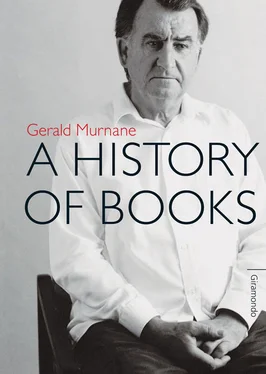I never understood those writers who claimed to find in a moment of inspiration their immortal subject matter. The work finds us, not we the work, and the most we can do is not to turn and flee from it. Sometimes, it seemed to me that all the lines I had written were only puttings-off, postponements, thousands of little writings, a series of books all hiding from the subject I had undertaken to write about; but a time came when it was no longer possible to flee from the meeting, no longer possible to write another book as though to beg for a postponement of my payment of my writer’s fees — a time came when I was dragged in front of my task, when I had to stand there or else fail to come out with the words that I alone could write…Every bit of writing that I began was a sort of escape, a sort of faithlessness, as though I was pleading with my daemon ‘Let me off just this once; the time has not yet come; let me first talk about other things; this is still my preparation, my finger exercises; I still don’t hear clearly my true voice; I am still full of strange melodies; I have to forget first all that I’ve heard or felt, to forget the penetrating literary rhythms that reverberate around me…Truly, I’ll write this first, and afterwards that, and afterwards, yes afterwards, I’ll devote myself to my true task. So, I wrote books, like someone trying to buy off his fate, to appease with small sacrifices his relentless deity. But I was always painfully aware that I could not escape so cheaply…
‘What will you write about?’ they asked. Sometimes I was amazed to discover that a writer’s fate is to be less able to turn away from certain tasks than from certain people or from certain responsibilities in the area of feelings and emotions. In despair, I saw that I might ask that question for years, perhaps for my whole life: what will I write about? Sometimes in conversation I mentioned ideas for books that I might like to write in the future; then, one day in the future, I would be astonished to find that I was now writing precisely that book which I had speculated about or talked idly about years before.
It might have been good to have run away from these conjectured books; to have ignored the lot of them; to have rested myself and stretched my limbs, gathered my strength, perhaps for other sorts of enterprises. But no; I could not have run away from a single letter. Obviously, every line belonged to that same task: the superfluous, the faulty, the shamefully hurried, the lazy…I know that I was never preparing for that certain ‘great book’ in which I would declare everything; the writer knows that he can never declare ‘everything’, and only the amateur or the expert lounging around the boundaries of literature — only such a one can write a great book. Rather, I believed that among all those slight occasional works…there would be one line or one paragraph in which I would say in my own style what no one but me could say. I thought it unlikely that what I had to say would be especially clever, strikingly original, dazzlingly intellectual; it might be that I would explain myself, when the right time and the right situation occurred, in commonplaces, since in life and in literature the decisive statement — the word or the opinion — which wholly explains the person is usually simple indeed. Sometimes I imagined that everything I was writing was a foreword, an excuse or pretence: in truth, there was only one character I would have liked to write about, to describe, and I was surprised to learn that this character was alive, that I knew her name, that I was acquainted with her, that I spoke often to her; I believed she was an older woman who stood at the centre of her social circle, who was not especially clever or good but who simply knew something that was perhaps the secret, so to speak, of life, although she was unable to express this with complete certainty in words; she was a perfectly balanced person; more than this I did not know… This woman’s secret, the secret of this unknown woman who was nearer to me than any real woman, I would have loved to discover while I wrote. Could this be called a writerly program? Of course not. And sometimes I was amazed at how wasteful was my search for her, how many memory-islands I had to wander across in my effort to reach her. Everything that I know about life or would like to know — she is the basis of it all; and yet I don’t know who this woman is, whether or not she lived near me once, whether or not I once met up with her. She is perhaps the Mother, the Other, the Eternal and Unknowable whom I yearn to meet up with; I do not know. But I do know that with every line I have written, with every book, and with every sort of literary work, I search for her, hoping she might answer me. Years would pass, filled with work and compromises and experiments, and during those years I would see the face of that female personage less and less clearly; I could not even hear her voice from the shadows. Then, for a moment, in some foreign country, I would catch sight of her. It is as though my work is nothing but a pretence: I write so that I can meet with her, if only once.
A man aged almost forty years was reading for the first time the last few pages of the English translation of a long work of fiction that had been first published in the Icelandic language in Reykjavik in the year before the man had been born.
The man and some of his friends often discussed the books of fiction that they had read recently. During their discussions, the man and his friends spoke as though they clearly remembered each book, referring to persons and events as though they were among the contents of the book and forgetting that the book consisted only of words arranged in sentences and that the persons and events so often discussed were image-persons and image-events from their own minds. The man and his friends liked to seek out and to read little-known books of fiction, especially books translated from foreign languages, and then to announce to one another that he or she had discovered a neglected masterpiece, one of the two or three greatest books of fiction that he or she had read.
While the man mentioned above was reading the book mentioned there, he hoped that he could later declare honestly to his friends that the book was the greatest work of fiction that he had read. He looked forward to reporting, for example, that he still seemed to hear the roaring of the waves in the small bay mentioned in the early pages of the book, the same bay that the chief character of the book would later append to his surname as though he was one of a notable landowning family rather than a foundling whose mother, as he so often complained during his later life, had sent him away, soon after his birth, in a sack. The man looked forward to reporting his feelings of shock and distress while he had read passages describing, so he intended to say, the squalor and the wretchedness of the poorer characters and their brutality towards one another. He looked forward to reporting his feelings of sympathy and his grudging admiration for the chief character of the book, who tried throughout his life to write poetry in the tradition of the sagas but who wrote mostly doggerel.
While he was reading the last few pages of the book, the man hoped that he would be able later to report to his friends not only the matters mentioned above but also that the ending of the book had been profound or magnificent or sublime. (These three adjectives were used often by the man and his friends when they discussed books of fiction.) The man hoped thus, but he was sometimes afraid that his hope would not be fulfilled.
Whenever he was reading some or another book of fiction, the man was especially alert to what he called, at that period of his life, the setting of the book: the landscapes or the scenery in which the characters lived their lives, as he would have said. A book of fiction would most impress the man if he seemed to see, while he was reading the book, a setting likely to become later a part of his own mind. It was not necessary that the setting should be of the sort called dramatic or picturesque, so long as it was spacious and lacking precise boundaries. The man was more than satisfied if, when he had left off reading a book of fiction, he seemed to see in his mind an expanse of mostly level grassy countryside or a range of forested hills or even street after street of suburban houses. Such scenery, so the man supposed, would provide space enough for any personage who had formerly been a character in a work of fiction to begin his or her existence as a presence in the mind of the man.
Читать дальше












